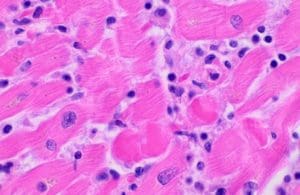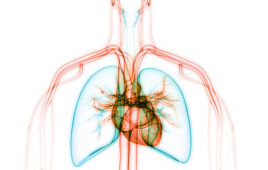
Histopathology of myocarditis. [Image courtesy of Wikipedia]
Israel’s Health Ministry is researching “tens” of cases of myocarditis, or heart inflammation, in people who have received the COVID-19 vaccine from Pfizer (NYSE:PFE) and BioNTech (NSDQ:BNTX).
More than five million people in the country have received the vaccine.
The agency, however, has not yet established a causal relationship between the events and the vaccine.
Pfizer has also reported that it has not observed a higher rate of myocarditis among vaccine recipients than in the general population.
The Israeli data suggest that myocarditis reports may be more common after the second vaccine dose.
Most of the people with myocarditis were 30 years old or younger.
A Pfizer spokesperson said the company is “aware of the observations of myocarditis that occurred predominantly in a population of young men who received the Pfizer-BioNTech COVID-19 vaccine.”
The company regularly meets with the Vaccine Safety Department of the Israeli Ministry of Health to review safety data. “Adverse events are regularly and thoroughly reviewed and we have not observed a higher rate of myocarditis than what would be expected in the general population,” a Pfizer spokesperson explained. “A causal link to the vaccine has not been established. There is no evidence at this time to conclude that myocarditis is a risk associated with the use of Pfizer/BNT COVID-19 vaccine.”
Establishing causation for myocarditis can be challenging. Researchers have linked the condition to an array of pathogens, including viruses, bacteria and fungi. Researchers have also linked COVID-19 to the condition.
In 2003, a Mayo Clinic case report linked the tetanus vaccine to myocarditis. The smallpox vaccine has also been associated with the condition.
A more recent study involving people with chronic conditions found the Pfizer-BioNTech vaccine effectively prevents symptomatic and severe COVID-19 infections. For people with heart and kidney diseases, the vaccine was 80% effective at preventing symptomatic infection.
Nadav Davidovitch, director of the school of public health at Israel’s Ben Gurion University, told Reuters that even if the vaccine resulted in an elevated risk of myocarditis, the benefits of administering the vaccine would likely still outweigh the risks.
Filed Under: Cardiovascular, Infectious Disease



